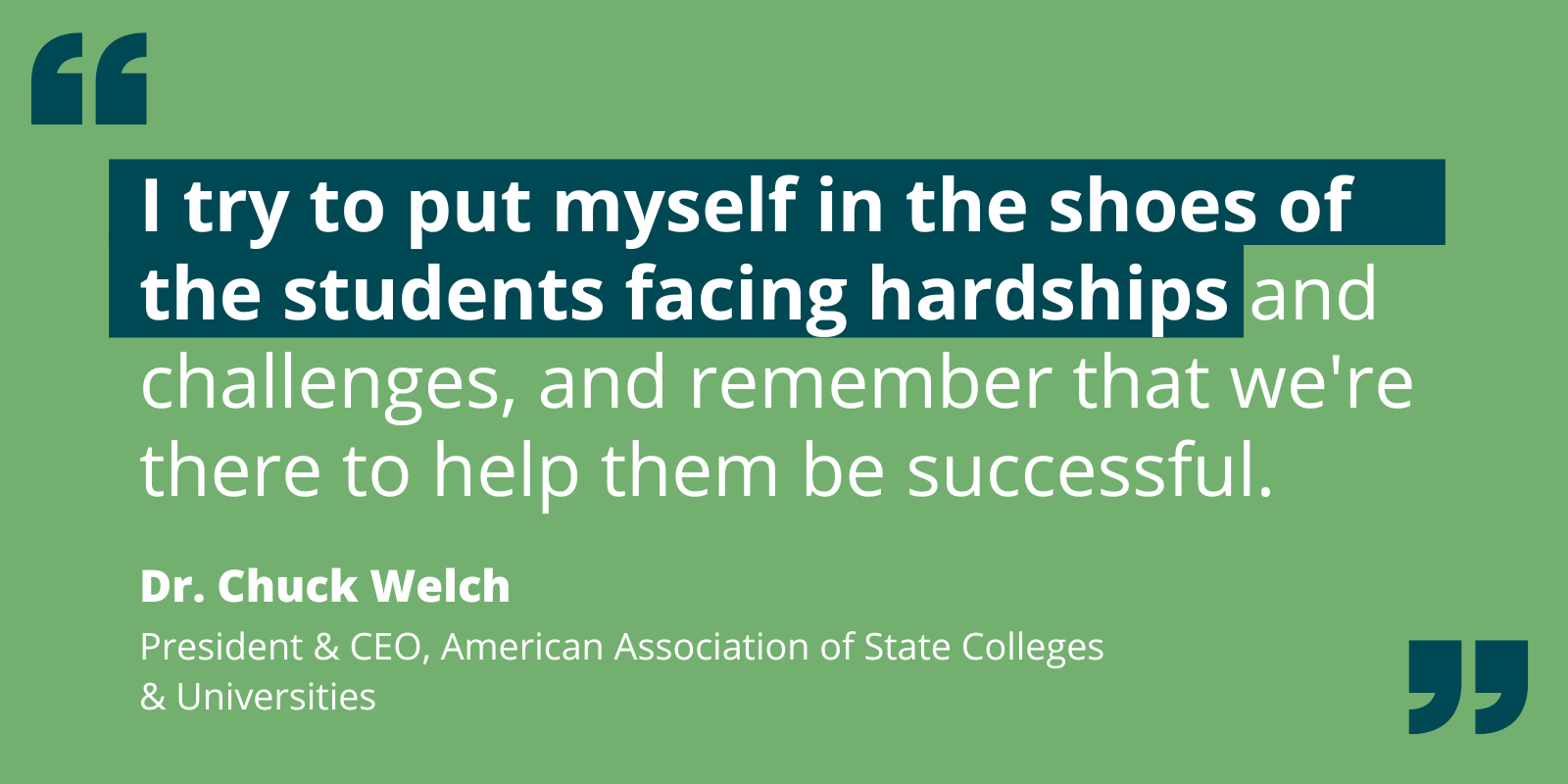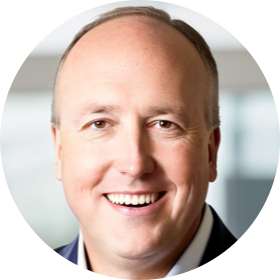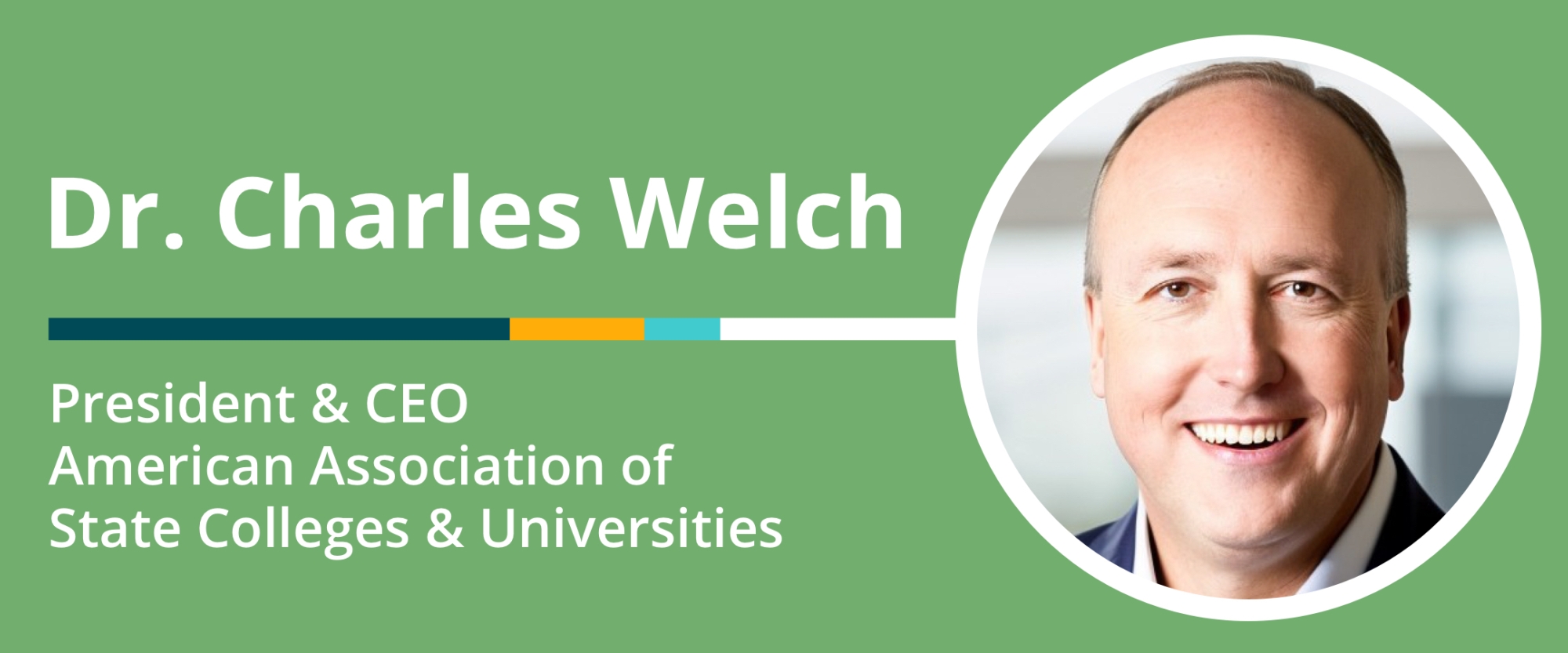At the University Innovation Alliance (UIA), we love exploring and comparing the many paths to higher education leadership. On this episode from the Weekly Wisdom podcast series, we spoke Dr. Charles Welch, President and CEO of the American Association of State Colleges and Universities (AASCU). President Welch (who prefers “Chuck” whenever possible) shared what inspired him to work in the education sector, leadership’s unique perspective, painful decisions for the good of the institution, and the value of authenticity and lived experience.
Learning Leadership by Example
In describing his leadership style, President Welch recalled a few pivotal moments early in his academic career:
“I was going to go to law school to be a politician. I had been president of the student body in high school, and then I became president of the student body at the University of Arkansas. I worked closely with Dan Ferritor, who was chancellor at the time, and then developed a relationship with Alan Sugg, who was president of the University of Arkansas system, and I began to think, ‘Wow, they can have tremendous impact on students, particularly students that come from backgrounds like mine where no one had really ever considered going to college.’ Alan Sugg was an incredibly effective leader, very kind, very engaging, and everything came back to student success. He gave me my first opportunity when I probably didn't deserve it, but he believed in what was possible.
“Throughout my career, I've tried to take some of those lessons about relationships. When you truly know individuals and try to understand where they're coming from, you have a much better sense of being able to make the right decision and focus on students. I want to always try to put myself in the shoes of the students that are facing hardships and challenges, and remember that we're there to serve them and help them be successful."

Understanding the Challenges of Presidency
Throughout his many higher ed top leadership positions, President Welch has see one commonality:
“The challenges were the same. The resources and complexities might be different, but we all dealt with a similar set of issues.”
He added that, for better or worse, people are the same regardless of the issue or institution:
“You're never going to find unanimity. Some folks are never going to be satisfied. But you move that along by having constant communication. You're approachable. You try to keep it real, and just really talk about, ‘Look, this is why, and this is what I have to consider.’ It doesn't always make everybody happy, but it definitely makes it easier when everybody feels they're being listened to.”
President Welch acknowledged the perception that leaders can seem out of touch with what’s happening inside their own institution:
“Here’s something one of my former presidents said when I was getting ready for my first presidency. ‘Chuck, you can't truly understand or appreciate the presidency until you've sat in the chair.’ I thought that was the most arrogant thing I had ever heard until I got there and realized there is not a single other person in the organization that looks through that lens. The vice presidents have responsibility for their respective areas. The students are looking out. The president is the one responding. I may not be able to make the staff happy because I need to do this for faculty and students, or whatever the case may be. And so, it's remembering that it's what is in the best interest of the institution and moving us forward and letting us achieve our goals, and that there's going to be very few situations that work for everyone.”
Hard Times in Higher Education
We sometimes ask our guests about the hardest leadership challenge of their career and President Welch related this painful story:
“In 2019, I got a call from the governor's office that Henderson State was facing serious financial challenges, and could the system step in an informal role? Number one, you get that call; you're going to say yes. Number two, I’d served on that campus from 2008 until 2011 and loved it dearly. We quickly found that it was far more severe than anyone realized, that Henderson was on the brink of closure. We got to work, and then COVID hit, and that exacerbated an already bad situation. The institution had to declare financial exigence and engage in severe retrenchment, closing programs, and terminating tenured faculty. It was heartbreaking. I didn't want to do it, but the other option was closing the university. And I lost some friendships. There were individuals who felt like I didn't stand up for them or that there were alternatives we were unwilling to explore, which simply wasn't the case.
“If not for that institution, many students in that part of the state aren't going to have a chance to go to college. And the beating I took was worth it if that meant we could keep that university open, continue to provide those opportunities for students, and ensure that, moving forward, the institution would be sustainable. What I learned probably more than anything is these positions come with difficult decisions and you have to grow a thick skin. You have to be willing to do what is right. I kept telling everybody, ‘It's a marathon. It's not going to happen overnight.’ But they're moving in the right direction. And I loved the last commencement ceremony I went to on that campus, watching those students, and reminding myself, if not for the hard work that many of us did, they're not walking across that stage that day and changing their lives.”
President Welch emphasized that if you know you’re facing a hard choice, resolve to face it sooner rather than later:
“We immediately went to our other six system campuses and said, ‘We're going to begin a very aggressive program review process.’ And their immediate reaction was, ‘You're going to cut all of our programs just like you did at Henderson.’ And I said, ‘No, no, no, no. We're going to try to prevent that while we're in a position of strength.’ That wasn't easy either, even though none of the institutions were even remotely close to that situation. But that's what I keep talking about to our campuses. You've got to be sustainable. Don't wake up one day and find yourself in that exigency environment.”
Leadership Advice and Portraits of Leaders
Sound leadership advice is valued in the higher ed sector, and President Welch is always happy to share his own early lesson with newcomers:
“The best advice I received came from Dan Ferritor, chancellor of the University of Arkansas. He said, ‘Chuck, don't ever forget who you are. Don't change who you are. Any position that you hold, the position is you. You are not the position.’ In other words, people will notice if you're not authentic in the way that you carry yourself or do things. I taught a first-year experience class one time and wore a tie every day because I felt like I was supposed to, and at the end of the semester, four or five students had written on the evaluations, ‘My favorite day was when you didn't wear a tie, 'cause you were applicable and real.’ That really hit home for me.
“There's always been a running joke at Arkansas when they would call the presidents of the different campuses up to the table to testify at legislative hearings, they would say, ‘Well, we're glad to have Dr. Burns. We're glad to have Dr. Lederman. We're glad to have Chuck.’ It was always Chuck. And I prided myself on that. I built those relationships. They felt comfortable. That's who I am.”
While many of our guests name leadership books when asked for reading recommendations, President Welch went in a different direction:
“I'm a huge believer in learning from history and experience. And I love nonfiction autobiographies or biographies of individuals who have walked that walk. I'll never forget a book called The Last Republicans, about George H. W. Bush and George W. Bush. It gave an entirely different perspective of where those two men came from and what drove their thinking and their policies. I've read a lot of the most famous Lyndon Johnson books, because he was a master at getting things done. I don't completely admire everything Johnson did, but I am fascinated by how a Southerner from Texas was able to get civil rights passed in that era. Sometimes you can learn what not to do. I've read plenty of those books and thought, ‘God, I don't want to be like him.’ But I have probably gleaned more from reading those books than any of the books written specifically on leadership, because I think so much of what drives a leader is how they were raised, the circumstances they came up in, the life challenges that they faced. I think that really informs who we are and the decisions that we make.”
Note: This interview in the Weekly Wisdom Series originally aired on February 19, 2024 as part of the University Innovation Alliance’s Innovating Together podcast, appearing live on Facebook, Twitter, and LinkedIn.
Links Mentioned in This Episode
- Dr. Charles Welch
- American Association of State Colleges and Universities (AASCU)
- University of Arkansas
- Dan Ferritor (former University of Arkansas chancellor)
- Alan Sugg (former University of Arkansas president)
- Henderson State University (school within the Arkansas State U system specializing in college-to-career pathways)
- The Last Republicans: Inside the Extraordinary Relationship Between George H.W. Bush and George W. Bush by Mark K. Updegrove
Bios of Guest and Co-Hosts

Guest: Charles Welch, President and CEO, American Association of State Colleges and Universities (AASCU)
Dr. Charles L. Welch became the seventh president of the American Association of State Colleges and Universities (AASCU) on January 15, 2024 after serving nearly 13 years as president of the Arkansas State University System, the state’s second largest higher education system. Dr. Welch has deep ties to AASCU, having led two member institutions, and served as chair of the AASCU Board of Directors twice from 2019-2021. He co-chaired and served as executive sponsor for both AASCU’s Presidential Postsecondary Value Commission Task Force and New Presidents Academy and Emerging Leaders Program. Dr. Welch is a past president of Henderson State University (AR) and the Arkansas Association of Two-Year Colleges; chairman of the board of the Arkansas Association of Public Universities; vice chair of the American Academic Leadership Institute Board of Directors; and Board of Directors member of the National Center for Higher Education Management Systems. A former board member of the Arkansas Sheriffs’ Youth Ranches, Dr. Welch was inducted into the Arkansas Boys State Hall of Fame. He was co-chair of the Executive Council of the Arkansas Department of Higher Education; chancellor of the University of Arkansas Community College at Hope-Texarkana; vice chancellor for academic affairs at Arkansas State University -Beebe; and dean of university studies at the University of Arkansas - Pulaski Technical College. He also worked at the University of Arkansas at Little Rock and served as an instructor of education and political science at three different colleges in Arkansas. Dr. Welch is a first-generation college student and the first member of his extended family to receive an advanced degree, earning a Bachelor of Arts in political science from the University of Arkansas, a Master of Arts in political management from The George Washington University (DC), and a doctorate in higher education administration from the University of Arkansas at Little Rock. He was awarded President Emeritus status by the Arkansas State University System in January 2024. The system also honored Dr. Welch with the creation of the Charles L. Welch Presidential Scholars Program.

Co-Host: Bridget Burns, Executive Director, University Innovation Alliance
Dr. Bridget Burns is the founding Executive Director of the University Innovation Alliance (UIA). For the past decade, she has advised university presidents, system chancellors, and state and federal policy leaders on strategies to expand access to higher education, address costs, and promote completion for students of all backgrounds. The UIA was developed during Bridget’s tenure as an American Council on Education (ACE) Fellowship at Arizona State University. She held multiple roles within the Oregon University System, including serving as Chief of Staff and Senior Policy Advisor, where she won the national award for innovation in higher education government relations. She was a National Associate for the National Center for Public Policy and Higher Education, and has served on several statewide governing boards including ones governing higher education institutions, financial aid policy, and policy areas impacting children and families.

Co-Host: Doug Lederman, Editor and Co-Founder, Inside Higher Ed
Doug Lederman is editor and co-founder of Inside Higher Ed. With Scott Jaschik, he leads the site's editorial operations, overseeing news content, opinion pieces, career advice, blogs and other features. Doug speaks widely about higher education, including on C-Span and National Public Radio and at meetings and on campuses around the country. His work has appeared in The New York Times and USA Today, among other publications. Doug was managing editor of The Chronicle of Higher Education from 1999 to 2003, after working at The Chronicle since 1986 in a variety of roles. He has won three National Awards for Education Reporting from the Education Writers Association, including one for a 2009 series of Inside Higher Ed articles on college rankings. He began his career as a news clerk at The New York Times. He grew up in Shaker Heights, Ohio, and graduated in 1984 from Princeton University. Doug and his wife, Kate Scharff, live in Bethesda, MD.
About Weekly Wisdom
Weekly Wisdom is an event series that happens live on Facebook, Twitter, and LinkedIn. It also becomes a podcast episode. Every week, we join forces with Inside Higher Ed and talk with a sitting college president or chancellor about how they're specifically navigating the challenges of this moment. These conversations will be filled with practicable things you can do right now by unpacking how and why college leaders are making decisions within higher education. Hopefully, these episodes will also leave you with a sense of optimism and a bit of inspiration.
Rate, Review & Subscribe
Learn why hundreds of people have rated this new podcast 5 stars! Please join others and rate and review this podcast. This helps us reach and inform more people -- like you -- to help increase the number and diversity of college graduates in the United States.
Click here, scroll to the bottom, tap to rate with five stars, and select “Write a Review.” Then be sure to let us know what you loved most about the episode! Also, if you haven’t done so already, subscribe to the podcast. We’ll be adding a bunch of bonus episodes to the feed and, if you’re not subscribed, there’s a good chance you’ll miss out.

